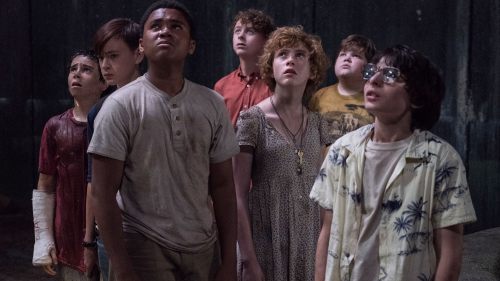THE KID WHO WOULD BE KING Review: The Stories We Tell Our Children
I believe in the transformative power of stories. If you know my writing, this is a big “no duh” statement, since a lack of that belief would probably preclude my having gotten into this film criticism business in the first place. I love myths and legends and narratives of human perseverance because those are the stories that demonstrate the values and strengths of a culture, the best parts of ourselves that serve as examples to live and grow by. And it’s something of a relief and reaffirmation that Joe Cornish, the writer-director perhaps best known for the superb Attack the Block, is on the same wavelength, as that is the underlying ethos that drives his latest, The Kid Who Would Be King. Taking aim at a younger audience, Cornish has built a loving testament to the power of legends to build a better future, with a surprisingly mature understanding of how that message has a place now more than ever.
Following a twelve-year-old school loser named Alex (Louis Ashbourne Serkis), The Kid Who Would Be King is, at surface-level, a transposition of Arthurian legend to modern London, wherein Alex pulls the mythical sword from the stone, recruits fellow child knights to his side, and must defeat the villainous Morgana (Rebecca Ferguson) before the end of a solar eclipse in four days’ time. With only a teenage Merlin (Angus Imrie) and a book of legends left behind by his absent father as guides, Alex must discover the power of the chivalric code in order to prevail against the coming darkness.
As trite as this sounds on paper, Cornish is well aware of the level of silliness inherent in his premise, never stooping to the point of self-parody but willing to have fun with the idea of modern reinterpretations of medieval magical threats, namely in how Alex and his friends primarily fight flaming skeletal warriors (quite scary by kids’ film standards) with the architecture and implements of urban geography. Cornish builds a world where its inhabitants are well aware of the absurdity of suddenly having to deal with magic and learn swordplay, but plays with that underestimation of the fantastical to allow his characters to build a legend of their own. Serkis makes for a properly incredulous but ultimately heroic lead, and while supporting knights Dean Chaumoo, Rhianna Doris, and Tom Taylor acquit themselves nicely as the supportive sidekick and converted bullies, respectively, it’s Imrie’s Merlin who consistently steals the show with his absurd fish-out-of-water takes and his excellent sense for comedic timing, so much so that Patrick Stewart’s periodic appearances as an older Merlin make me miss Imrie’s version.
But for all the fun and spectacle that Cornish brings to the affair – with some excellent cinematography from Bill Pope, I might add – there’s clearly much more on his mind that a bit of escapist fantasy for the younger crowd. The Kid Who Would Be King makes no bones about the current state of the world, making upfront allusions to the scary, directionless bent our culture has succumbed to with the rise of authoritarianism and cultural division, all in the vague sense of wrongness that children know and understand from growing up in a world with problems they did not create. Alex’s journey is more than just a fun romp through the tropes of centuries past, but it’s a tale about how those tropes can inform a new way forward, inspired by the lies of generations prior in order to transform them into attainable truths. You might say this is Cornish’s hopeful response against older generations’ acquiescence to Brexit or Trump, but it’s more of an affirmation to kids today that they are capable of making a difference, and the stories from which they draw their inspiration are as true as they want them to be.
The Kid Who Would Be King isn’t without its faults, as redundant dialogue and a few unnecessarily drawn out beats in the second act pad the film out to about fifteen minutes too long, but the film is made with so much passion and wit that it’s easy to forgive those excesses. Joe Cornish wants kids to walk away from his film with the knowledge that they too can make the heroic aspirations of their fantasies a reality, even if that heroism isn’t about literal physical fighting, but instead about simple acts of kindness and love. But there’s certainly nothing wrong with contextualizing that fight with knights, dragons, and magic to make the new legends we create a bit more fun.



